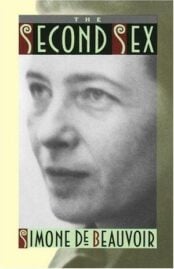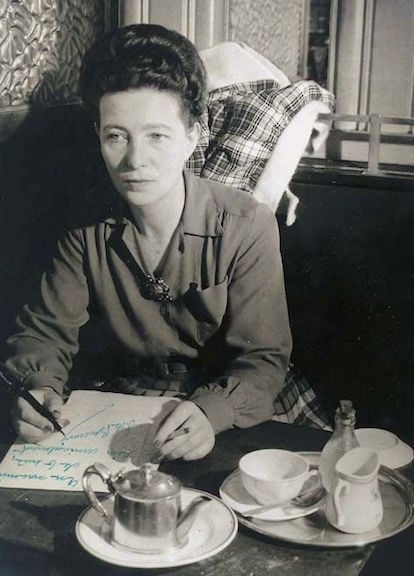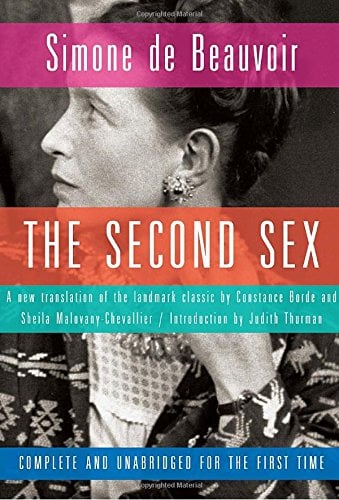The Second Sex by Simone de Beauvoir (1949)
By Nava Atlas | On March 16, 2019 | Updated May 1, 2025 | Comments (0)

Simone de Beauvoir (1908 –1986) was a French author, existential philosopher, political activist, feminist, and social theorist whose most popular and enduring work is The Second Sex.
Published in 1949, it was considered quite radical for its time and made de Beauvoir an intellectual force to be reckoned with. The book has inspired generations of women to question the status quo and strive to change it.
De Beauvoir, who wasn’t yet forty when her magnum opus was published, explored the history and mythology of the female gender. It was first published it in two volumes, Facts and Myths and Lived Experience (Les faits et les mythes & L’expérience vécue).
The Second Sex is a cornerstone works of feminist philosophy and the second wave feminist movement. It’s still read and studied to this day as an essential manifesto on women’s oppression and liberation. First published in the United States in 1953, it was a time when the media’s message to women was that their place was in the home.
The English translation by H.M. Parshley was often criticized as subpar, even omitting swathes of text. A new translation came out in 2009, and though most critics found it to be better than the first, it, too, has had its detractors.
Despite some snarky reviews by male reviewers, the book was an immediate success in the American market, and was recognized as an instant classic. Here’s a review of The Second Sex from 1953, when the book first appeared in print in the United States.
Feminism — an ever timely topic, from a 1953 review
From the March 1, 1953 review by Mary Lapsley of The Second Sex by Simone de Beauvoir in the Cincinnati Enquirer:
It is with timidity that a reviewer who is also a woman approaches Simone de Beauvoir’s The Second Sex. If one lavishly praises it, one lends oneself to the suspicion that one does so merely through feminine complicity. If one condemns it, one lays oneself open to the charge of playing traitor to one’s sex. Yet it is perhaps through this very ambivalence — of choice, the existentialist would say — that one may arrive at a just appraisal.
When first published in France in 1949, Le Deuxieme Sexe appeared in two volumes: Facts and Myths and Lived Experiences. In Fact and Myths, Mlle. de Beauvoir states her reason for writing on a theme that has already had a large and almost always partisan literature.
“Books by women on women are in general animated in our day less by a wish to demand our rights than by an effort toward clarity and understanding. As we emerge from an era of excessive controversy, this book is offered as one attempt among others to confirm that statement.”
Indeed, the subject is timely. World War II required of women active participation in fields formerly closed to them. The UN Commission on the Status of Women maintains that the equality of sexes is now becoming a reality; that they must be regarded as equal is a necessary tenet in any Democratic challenge to totalitarianism.
. . . . . . . . . .

Philosophical Quotes by Simone de Beauvoir
. . . . . . . . . .
An existentialist perspective
Moreover, the importance of childhood environment on adults has of recent years been stressed to the point of exaggeration. The child is father to the man, and also, of necessity, the child is mother to the woman. Simone de Beauvoir is an existentialist, and it is in the terms of that philosophy that she views the history of her sex.
As an existentialist, Mlle. de Beauvoir finds that “the drama of woman lies in this conflict between the fundamental aspirations of every subject (ego) — who always regards the self as the essential — and the compulsions of a situation in which she is inessential.”
“Now what peculiarly signalizes the situation of the woman is that she — a free and autonomous being like all human creatures — nevertheless finds herself living in a world where men compel her to assume the status of the Other.” This masculine insistence that woman be the inessential, Mlle. de Beauvoir regards as the crying injustice; this she points out in 732 closely packed, reiterative pages.
“Men have presumed to create a feminine domain — the kingdom of life, of immanence — only in order to lock women therein.”
From the biological to the psychoanalytic
To this fate woman is condemned, says Mlle de Beauvoir, neither by facts of biology nor by immutable laws of her psychological makeup; her destiny is shaped by the society she lives in. As she acts in that society, according to existentialist belief, she makes herself; she chooses, by accepting a passive role, her subjugation to the male.
From biological facts, Mlle. de Beauvoir turns to the psychoanalytic. These are, of necessity, less absolute, but here too she finds nothing inherent in woman’s psychological makeup that dooms her to a role of “immanence.” In some sixty pages, there follows a brief survey of the history of woman from the nomads through the period of the French Revolution to the present day.
. . . . . . . . . .

Simone de Beauvoir books on Bookshop.org*
. . . . . . . . . .
Man’s myths about women
Man has always used myths to protect himself from what he has not understood. Mlle. de Beauvoir goes to some lengths to describe man’s myths about woman. She is the Earth Mother and Death; she is Magic and the Servant; she is the Moon and Night, the Sea and Tides.
In her study of the myths about woman, Mlle. de Beauvoir has chosen five writers, to show the myth makers’ varying attitudes towards that mystery — the Other. These are: Motherlant, D.H. Lawrence, Claudel, Andre Breton, and Stendhal.
D.H. Lawrence believes that “woman is not evil, she is even good — but subordinated.” Claudel finds woman to be the Handmaid of the Lord. “The more one demands complete submission of her salvation.” In the ever changing forms of his mistresses, Andre Breton holds woman to be the essence of pure poetry.
Finally, breathing a sigh of relief, Mlle. de Beauvoir presents Stendhal as the Romantic of Reality, “demanding woman’s emancipation not only in the name of liberty but also in the name of individual happiness.”
. . . . . . . . .

Feminist Quotes from The Second Sex
. . . . . . . . . .
Volume two, “Woman’s Life Today”
This constitutes the sum of the first volume. The second volume, “Woman’s Life Today,” analyzes the great detail in women’s development from childhood through her formative years of young girlhood and sexual initiation to — with a bypass on Lesbianism — marriage, motherhood, and social life — and so on to maturity and old age.
Withe a degree from the Sorbonne, and a considerable career as a novelist, essayist, and teacher of philosophy, Simone de Beauvoir comes to her thesis as a dedicated soul. Her conclusions in The Second Sex are naturally existentialist: there is, she states, no physiologic reason for conflict between man and woman — “The battle of the sexes is not immediately implied in the anatomy of man and woman … The woman who is shut up in immanence endeavors to hold man in that prison also.”
Whether or not one accepts the existentialist’s view, one must find that Mlle. de Beauvoir has done a service in pulling apart the tangled strands of fact and myth about woman’s place in society. The man who is neither sociologist, historian, nor writer may well be uninterested in her report. Most intelligent women will find it rewarding.
. . . . . . . . . .
 . . . . . . . . . .
. . . . . . . . . .
An able and serious piece of writing, if too long
Written in a style that is often declamatory, sometimes shrill, the book is too long. The first volume is better, partly because the second contains an excess of repetition. Eager as Simone de Beauvoir is to be thorough, there is really no scientific check on her statements.
Moreover, while deploring — and rightly this reviewer believes — the dogma of both Freudian and Adlerian psychoanalysts, Mlle. de Beauvoir has in her account of women’s difficulties relied too much on these same psychoanalysts, so that much that she says about presumably normal women is colored by abnormality.
Despite its occasional maddening repetitiousness, The Second Sex is an able and serious piece of writing. Incidentally, the translation is top-notch, and the translator’s notes throw further light on the subject of women in the United States. But there have been other books that in their philosophy have offered an equally good solution.
In any case, if “know thyself” is, as Socrates contended, the beginning of wisdom, Simone de Beauvoir, in having attempted to clear the air of the many hoary superstitions and misconceptions about women, has immensely helped her sex.
More about The Second Sex by Simone de Beauvoir
- Reader discussion on Goodreads
- Introduction to Simone de Beauvoir’s The Second Sex
- The Second Sex: Woman as Other
. . . . . . . . . .
*This is a Bookshop Affiliate link. If a product is purchased by linking through, Literary Ladies Guide receives a modest commission, which helps maintain our site and helps it to continue growing.
Leave a Reply